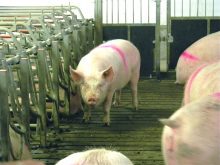Discussions at the recent forum targetted obstacles to putting local organic products on store shelves
Organic farmers from around the province gathered recently for a day-long session hosted by the Manitoba Organic Alliance to hash out ways to strengthen the sector.
At tables organized into general commodity groups such as grain, beef, small livestock and horticulture, ideas from each brainstorming session were collected for later analysis by consultants who will use them along with data collected from a recent survey to develop an action plan for the organic sector in the coming months, said MOA president Kate Storey.
With $15,000 in Growing Forward funding, MOA is organizing a strategic planning effort aimed at eliminating barriers to the sector’s growth instead of trying to tie up loose ends in a piecemeal fashion as had been done in the past.
Read Also

Mazergroup’s Bob Mazer dies
Mazergroup’s Bob Mazer, who helped grow his family’s company into a string of farm equipment dealerships and the main dealer for New Holland machinery in Saskatchewan and Manitoba, died July 6 from cancer.
Discussions at each table found similar challenges among all groups, she added.
“It’s always that there are glitches in the value chain. There is consumer demand for organics, and yet that demand is being filled by production coming in from the United States or other provinces,” said Storey.
“We want to find out how we can make more opportunities for Manitoba farmers.”
MOA, an umbrella group representing farmers, buyers, processors and certifiers in the province’s organic sector, was formed five years ago. It represents the value chain that, via the certification process, reaches all the way to the consumer documented with an extensive paper trail.
“Our commodity is that organic certificate,” said Storey. “So, to get all those pieces of the value chain puzzle lined up properly, it takes a lot of talking.”
The barriers to putting locally grown organic food on store shelves in Manitoba can be daunting. For example, demand for organic roasting chickens and turkeys is high, and many farmers would be eager to raise them as a profitable sideline, but many pieces of the value chain puzzle are missing, she said.
Without an organic-certified processor or hatcheries producing broiler chick genetics suitable for organic conditions, and easily accessible organic feed distributors, the only existing option is “do-it-yourself” integrated production via clandestine or “black market” channels.
Discussion at the organic beef table touched on similar themes, said Laura Telford, the organic business development specialist for Manitoba Agriculture, Food and Rural Initiatives.
“We’re imagining a lovely federally inspected slaughter facility in Carman that meets all of the criteria for organic meat,” said Telford, who added that the last certified processor in the province recently dropped its certification.
Although organic beef is booming in the province, virtually all of the production goes elsewhere, and the lack of a local slaughter plant represents a “major challenge” for serving local demand.
“The export market is doing very well, but obviously producers here would like to keep a larger share of the profits,” said Telford.
The discussions, along with the data collected from a recent survey that garnered 50 responses, will provide input into the upcoming strategic action plan – the sector’s “marching orders” for the next few years, she added.
Brenda Frick, a longtime organic sector participant, is working with consultancy firm called Resilient Solutions, which has been hired by MOA and MAFRI to crunch the data from the meetings and surveys and issue the report at the end of March.
“Each of the different subsectors has identified what their barriers are, what actions they could take, and what opportunities they saw,” said Frick.


















